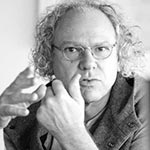Art Thinking ist eine Diskussionsplattform zur künftigen Rolle der Kunst im Kontext von Industrie, Gesellschaft und Ökologie. Das Forum wird vom innovativen Kommunikationsdesign-Unternehmen Hakuhodo unterstützt. Zusammen mit dem Interesse der Ars Electronica an neuen Technologien und deren Auswirkungen auf die Gesellschaft ergänzt ihr zukunftsweisender kreativer Ansatz das Thema des Panels: die Zukunft der Kunst und wie innovative und kreative künstlerische Beispiele zur Humanisierung der Technologie und zur Verbesserung der Gesellschaft genutzt werden können.
Moderator: Hideaki Ogawa (JP)
Speakers: Alexander Mankowsky (DE), Olga Kisseleva (RU), Mara Balestrini (IT)
Video
Biographies

Mara Balestrini (IT) is a Human Computer Interaction (HCI) researcher and a technology strategist. She is currently CEO at the innovation agency Ideas for Change and a co-founder of SalusCoop, the first Spanish cooperative for citizens’ health data. Mara’s work sits at the intersection of civic technology, design and Action Research. She has authored over 30 publications on these subjects and coordinated projects such as Making Sense EU, Bristol Approach and #DataFutures. Mara earned a PhD in Computer Science from the Intel Collaborative Research Institute on Sustainable Connected Cities at University College London. Her work has been awarded at ACM CHI, ACM CSCW, Ars Electronica, among others, and featured in international media such as the BBC, The Guardian, The Financial Times and El País.

One of the key figures in international art&science fild, Olga Kisseleva (RU) approaches her work as a scientist. She calls upon collaborations with exact sciences, biology and geophysics and she proceeds with experiments, calculations and analyses, while strictly resprecting the methods of the scientific domain. Her works are present in many of the worlds most important museum collections including the Centre Pompidou, Louis Vuitton Foundation, ZKM, Moscow Museum of Modern Art and the NY MoMA. Olga Kisseleva teaches contemporary art at the Sorbonne University of Paris, she is the head of Art & New Media program and Founding director of Art&Science International Institute.

Alexander Mankowsky (DE), born 1957 in Berlin, studied Social Science, Philosophy and Psychology at the ‘Freie Universität Berlin’. In 1989 he started working in the research institute of Daimler in Berlin. The multidisciplinary approach in the institute integrated a wide array of disciplines, from social sciences to artificial intelligence. His current working topics are Futures Studies, focussed on the ever-changing culture of mobility, the interdependency of social and technological innovation and other aspects of envisioning paths into the future.

Hideaki Ogawa (JP/AT) is a creative catalyst, artist, educator, curator and researcher in the field of art, technology, and society. He is currently a Co Director of Ars Electronica Futurelab as well as a Director of Ars Electronica Japan. His special research focus is Art Thinking and he has conducted many innovation projects in Art and Science, Art and Industries and Art and Society. In addition to the artistic innovation research, he has realized international projects for festivals, export programs like Ars Electronica in the Knowledge Capital, School of the Future with Tokyo Midtown and the Ars Electronica Center in Linz. He is also a representative and artistic director of the media artist group h.o. He searches for witty new ideas depending on current social contexts, and creates artistic expressions with the speed of technological progress.


